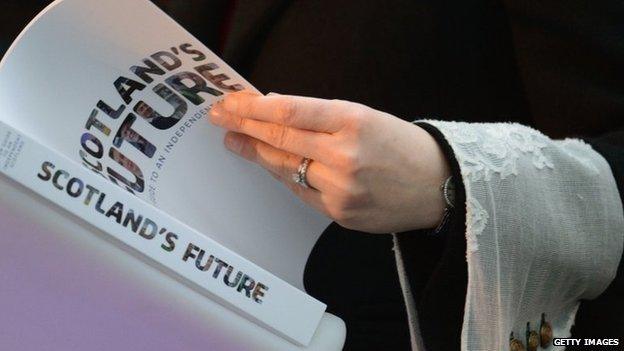Scottish independence White Paper: What's in it for me?
- Published

The White Paper runs to more than 600 pages
Read the White paper, external by all means. Read and absorb the entire book, all 600-plus pages of it.
But, if you are in search of an intriguing development, cast a glance at page 40 of the summary.
There you will find one of the many questions which Scottish ministers pose to themselves, founded upon queries they have already heard from organisations and members of the public.
This particular question is: what will independence deliver for me?
It may sound selfish, it may sound self-obsessed. But it is a version of the question which voters ask themselves, if not canvassers, when they are preparing to cast their choice.
The answer to this particular question, on page 40, are, in order: that independence will deliver a "transformational change" in childcare, will cut energy bills, will preserve pensions and will scrap the so-called "bedroom tax" while defending benefits.
Nary a mention of the European Union. Not a word about the written constitution. Nato? Set it to one side.
The launch took place at the Glasgow Science Centre
This is populist, retail politics. This is a pure pitch for support, distinct from the structural elements of independence.
Remember that these are policy offers by the incumbent Scottish government, rather than fundamental elements of the constitution.
Alex Salmond sees it as a way to appeal over the heads of his political rivals to the voting public. He calculates privately that most folk discount the contention over membership of the EU, reckoning - if they think about it at all - that such matters would be sorted.
Ditto Nato. The currency, of course, is an entirely different matter. The debate over that - whether rUk would tolerate a sterling zone - is substantive, real and germane to voters' lives.
That is not, repeat not, repeat not, to dismiss the structural issues. They are important, significant and worthy of examination.
It is, however, to emphasise that the verdict on independence will be delivered by the people in a referendum, not by an expert tribunal of judges weighing up the evidence submitted to them by learned counsel.
In practice, the White Paper entrenches the existing disputes over the structural elements of independence - especially the currency.
But the populist offer on childcare, according to one of Mr Salmond's rivals, "opens up a new front."
That same rival reckons that the key now is whether the family friendly offer is seen as credible.
Which brings in debate element two. Can Scotland afford the policies on offer from the incumbent government, for the future under independence? Yes or no.
The White Paper, then, provides a battleground for this contest to develop.